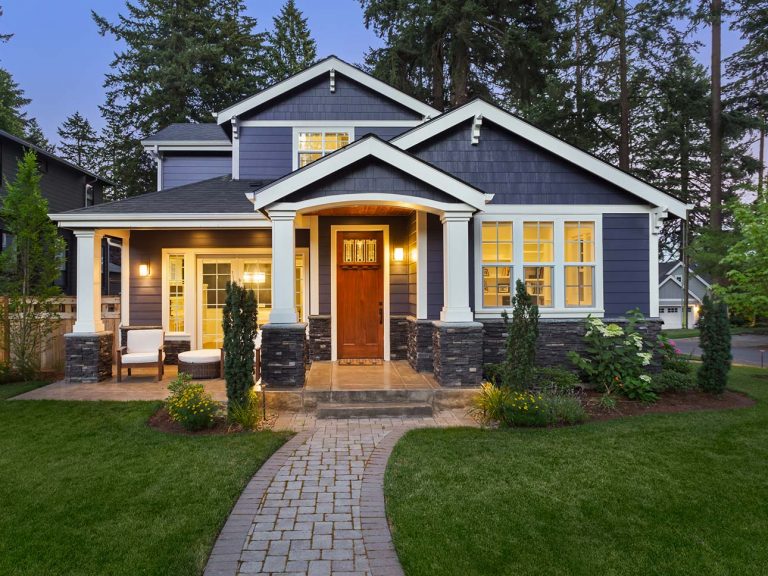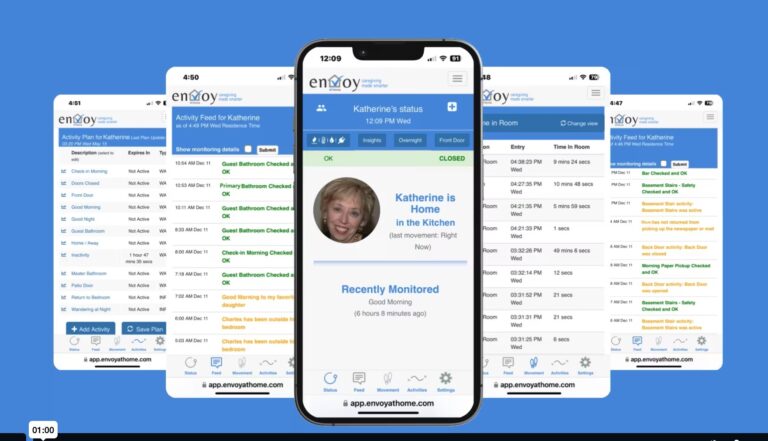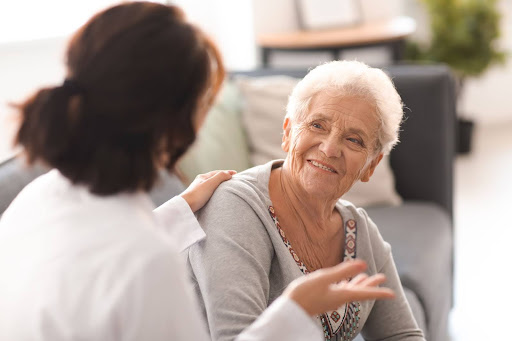As a family caregiver of a parent, you have optimistic assumptions about your aging loved one’s behavior and habits. But when you install an elderly monitoring system, you may be very surprised by what you discover. These systems provide a comprehensive view of your loved one’s daily routine and activities, shedding light on aspects that you may not have been aware of before. From sleep patterns to compliance with medical orders, from noticing signs of being unwell to consistently wearing emergency response devices, there is a lot to learn about your loved one’s well-being.
As caregivers, we often bear the weight of responsibility for our aging parents’ safety and health, and this can be overwhelming. That’s why using an elderly monitoring system can be a game-changer, giving you the information and support you need to provide the best care possible. In this blog post, we’ll explore the top surprising things caregivers have discovered about their loved ones when using an elderly monitoring system.
The Hidden Realities of Senior Sleep Patterns
One of the most eye-opening discoveries for many caregivers who utilize an elderly monitoring system is the often erratic or poor sleep patterns of their aging loved ones. Sleep, a critical component of overall health, becomes even more vital as one ages. It plays a crucial role in cognitive well-being, helping to process memories, maintain emotional balance, and support brain health. Research indicates that poor sleep can exacerbate cognitive decline and may even increase the risk for developing Alzheimer’s disease according to the National Institute on Aging.
Additionally, the risk of falls – a major concern for caregivers and medical professionals – escalates with poor sleep. Katie L. Stone, PhD, of the American Geriatrics Society reports that fatigue and drowsiness can impair judgment and reaction times, making falls more likely. Falls are the leading cause of injury among older adults, underscoring the importance of monitoring and striving to improve sleep patterns through interventions that an elderly monitoring system can help identify and facilitate.
Because most independent adults spend their overnights alone, sleep patterns are hidden from their caregivers. By understanding the intricate relationship between sleep and health, caregivers should work with their loved one’s medical professionals to prioritize and address sleep issues, potentially preventing further health complications and improving their peace of mind and their parent’s quality of life.
When They’re Resistant to Compliance
Deploying an elderly monitoring system can reveal unexpected and hidden behaviors in an older adult’s day-to-day life, including their level of compliance with medical and safety recommendations. It’s not uncommon for caregivers to discover that their loved ones, while independent, might not always follow through with their medication schedules, engage in recommended physical activities, or adhere to safety guidelines, such as using assistive devices for mobility. This resistance to compliance, whether due to forgetfulness, a desire for independence, or skepticism about the necessity of certain precautions, can lead to concerns for caregivers who only want what’s best for their loved one.
Understanding these behaviors is crucial in addressing them effectively. With the insights gained from a senior monitoring system, caregivers can initiate open and respectful conversations with their loved ones about the importance of compliance for their health and safety. These systems provide an opportunity to identify specific areas of resistance and work together to find acceptable solutions that honor the older adult’s desire for independence while ensuring their well-being. By leveraging the data provided by these monitoring systems, caregivers can implement supportive strategies tailored to their loved one’s unique needs and preferences, fostering a safer and more cooperative living environment.
The Forgotten (or Ignored) Emergency Response Device
The introduction of an elderly monitoring system into a caregiver’s toolkit often brings to light an unexpected challenge: the unworn personal emergency response devices. These devices are designed to offer seniors a direct lifeline in case of an emergency to ensuring their safety and providing peace of mind for both the senior and their caregiver. However, it’s not uncommon to find that they are sometimes left unworn. The reasons vary from discomfort with the device, forgetting to put it on, or a desire for maintaining a sense of normalcy without the constant reminder of vulnerability. Sometimes an older adult will leave it behind out of convenience when they’re just making a quick visit to the bathroom or the kitchen.
This continual oversight should significantly impact a caregiver’s confidence in the safety of their loved one, especially in cases where the older adult has cognitive impairments that may affect their memory or judgment. Remote monitoring systems for the elderly address this gap effectively. By providing real-time data and alerts, these systems ensure that caregivers are not solely reliant on their loved one’s use of a wearable device to gauge their safety.
This layered approach to monitoring complements the use of personal emergency devices, ensuring that even if the device is forgotten, the safety net it provides remains intact, thus reinforcing the caregiver’s peace of mind and the senior’s safety.
The Hidden Signs That It’s Time to Ask the Doc
It’s often the subtle, overlooked changes in an elderly loved one’s behavior that signal it’s time to consult a healthcare professional. An elderly monitoring system plays a crucial role in uncovering these hidden signs, significantly reducing caregiver stress by providing invaluable insights. Subtle shifts in daily routines, like changes in eating habits or an increase in inactivity, can be early indicators of underlying health issues. A decrease or increase in activity levels might not just be a normal part of aging but could signify a change in cognitive or physical well being that should be explored by a clinician.
Self-reporting by the patient is important, but not always reliable. Armed with the information provided by a senior monitoring system, caregivers can approach their loved one’s healthcare providers with concrete examples of behavioral changes, ensuring that their concerns are taken seriously and addressed promptly. This proactive approach underscores the invaluable role of technology in bridging the gap between independent living and the need for medical intervention, ensuring that our loved ones receive the care they need when they need it.
Elderly Monitoring Systems with Dignity – No Intrusive Cameras, No Recording Devices, No Cumbersome Wearables
In addressing the balance between the safety and dignity of our loved ones, modern elderly monitoring systems like envoyatHome meet the rigorous requirements of both caregivers and independent older adults. These systems avoid the pitfalls of invasive approaches by forgoing the use of intrusive cameras, devices that listen and record, and cumbersome wearables that may be impractical for an adult on a cognitive journey. By prioritizing discreet, full passive forms of monitoring, these systems respect the autonomy and personal space of seniors, all while providing caregivers with the necessary insights to manage their responsibilities with lower caregiver stress.
This thoughtful approach to design recognizes the importance of independence in the lives of older adults and integrates almost invisibly into older adults’ daily routines without making them feel watched or infantilized. Innovations such as sensor technology and smart home integrations allow for a comprehensive yet respectful oversight, alerting caregivers to potential issues without compromising the senior’s sense of privacy. This balance ensures that the dignity of older adults is preserved, reaffirming that their autonomy and independence are paramount in the execution of caregiver duties.
Learn more at www.envoyatHome.com today.



